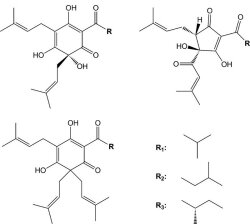Web Date: February 14, 2012
Beer’s Bitter Compounds Stimulate Stomach Acids
News Channels: Biological SCENE, Analytical SCENE
Keywords: beer, hops, bitter acid, gastric acid secretion, acid reflux, stomach cancer, ulcers

On a hot summer day, sipping a cold brew can be a relaxing treat. But when the beer hits the stomach, it stimulates the release of gastric acid, an overabundance of which can lead to ulcers, acid reflux, and even stomach cancer. Now researchers report that the bitter acids derived from hops are key players in stimulating gastric acid secretion (J. Ag. Food Chem., DOI: 10.1021/jf204306z).
Previously, scientists had found that beer contains a cabal of compounds, such as ethanol, maleic acid, and succinic acid, that can promote gastric acid secretion. Veronika Somoza, of the University of Vienna, and her colleagues wanted to check out a class of compounds that hadn’t been studied yet: the bitter acids from hops.
So Somoza’s team tested five styles of German and Austrian brews: dark, wheat, lager, pilsner, and alcohol-free. They quantified each brew’s bitter compounds using high-performance liquid chromatography and then tested human gastric cells’ response to the beer and to its individual compounds. To detect gastric acid, the researchers monitored the cells’ proton secretion using a fluorescent dye. They also measured activation of four genes involved in gastric acid secretion through real-time quantitative polymerase chain reaction.
The team found that acid secretion began at concentrations of bitter acids, such as β-bitter acid, as low as 0.014 mg/L. In comparison, succinic acid promoted a similar level of gastric acid release at 35 mg/L. “The bitterest-tasting of the bitter acids stimulate gastric acid secretion more than less-bitter-tasting bitter acids,” Somoza says.
The findings are good news, she adds: Brewers could produce stomach-friendly beers by choosing their hops and controlling how long they heat the ingredients.
- Chemical & Engineering News
- ISSN 0009-2347
- Copyright © American Chemical Society
On the contrary, there are significant studies demonstrating the benefits of beer (hops) in calming the stomach.
Beer is a very complex drink, chemically, and can vary from brew to brew--and even batch to batch of the same brew. Getting a full idea of all the impacts it can have on humans will take a lot more research!
If only I had known.